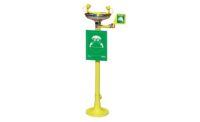The importance of having true commercial-quality shower valves in hotel applications cannot be stressed enough.
Commercial-quality shower valves are designed and manufactured for multiple users making constant adjustments on a daily basis. Too often, contractors looking to cut costs will substitute an inferior residential-quality shower valve in place of what the architect or specifying engineer has specified for a hotel application.
Portrayed in a glamorous shot from the Internet or a pristine catalog representation, residential shower valves look very similar to their commercial counterparts. In certain circumstances, the residential model might even have more style than the commercial version, but don’t be misled: the quality level differs dramatically, as will eventually show in the performance and maintenance. Over the life of your facility, the results of substituting residential models for commercial ones will become painfully and expensively obvious.
The effects of substituting a residential-quality valve or shower unit will be evident fairly quickly, as these products are more prone to damage and repairs; they simply are not designed or built to withstand the demands that come with the multiple users inherent to hotel applications.
Here’s a quick overview of what’s under the “hood” of a commercial-quality shower unit vs. a residential-quality shower unit.
Stops
Commercial:Integral stops standard.
Residential:No stops near the unit — water needs to be turned off remotely.
Effect:Replacing a leaky cartridge requires shutting off the water to the complete building, thereby inconveniencing all guests.
Showerhead and handle
Commercial:Showerhead and handle are solid metal — usually brass.
Residential:Showerhead and handle typically are a plastic composite or less-reliable zinc-based material.
Effect:With multiple guests modifying the position of a showerhead a multitude of times during the week, the head gets heavier usage and is prone to a higher risk of breakage or failure.
Trim pieces
Commercial:Trim pieces have a metal substrate.
Residential:Trim pieces typically are plastic or composite material.
Effect:With multiple guests a week and constant cleaning, the trim pieces see much more usage than they would in a residential application. Again, feel the difference in the weight to judge for yourself.
ADA complaint
Commercial:Yes.
Residential:Selection of ADA-compliant valves is very limited.
Effect:A true ADA shower package with a handheld unit needs to have a “throttle-down” or “non-positive shutoff” feature. Don’t be fooled by residential units making false claims of being ADA compliant when they are not.
Cartridges
Commercial:Ceramic disc cartridge.
Residential:Washerless cartridge.
Effect:Ceramic discs are much more robust and unlike a washerless cartridge design, have no springs that can fail.
Flow
Commercial:2.5 gpm/1.5 gpm.
Residential:1.5 gpm.
Effect:Residential shower valves generally have the lower flow rating, but in a hotel setting guests often place value on a luxury shower experience.
Back-to-back installation
Commercial:Back-to-back installations available.
Residential:None available.
Effect:Commercial valves are designed to allow back-to-back installations in the wall. This eliminates the need to run redundant supply lines and simplifies installations when the showers are in adjoining units or in close proximity.
As you can see, the two designs are completely different and one cannot be substituted for the other without significant long-term repercussions. Cost only is one factor. Equally important to consider is the number of users who will be operating the shower, the type of abuse it may receive and whether it can adequately meet the performance standards guests expect. Also consider not just the initial cost of the units, but the cumulative cost of maintenance over the complete life of your facility.
There’s a reason manufacturers produce different products for commercial and residential markets. Trust that reason and you’ll save yourself a lot of expensive regrets.
HELPFUL LINKS:


